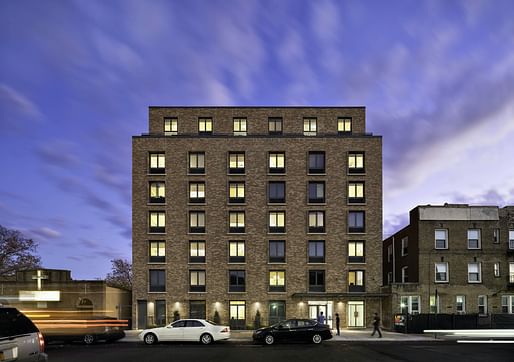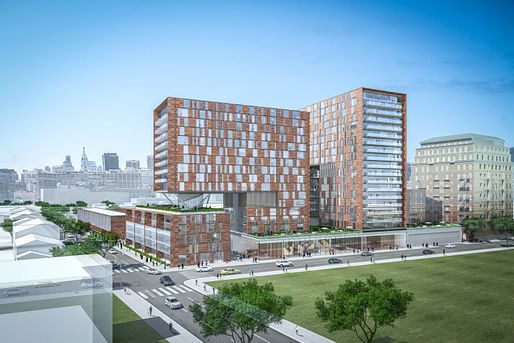

The Biden administration has announced a range of measures intended to address the US housing crisis. The measures, which do not require congressional approval, and are separate from measures included in the pending infrastructure bill, aim to built and preserve 100,000 affordable homes over the next three years.
Among the measures would be an expansion in the Capital Magnet Fund grant program to support Community Development Financial Institutions (CDFIs) seeking to build affordable homes. Both CDFIs and non-profit housing groups would be eligible for funding from the program, which this year made $383 million available for affordable housing production.

The measures would also seek to accelerate the development of manufactured housing, which are factory-built before transported to site. To aid this, the Biden administration will encourage state and local governments to reduce zoning and financing regulations which currently discourage prefabricated units in favor of traditional construction methods.

The measures are a response in part to recent findings by the White House Council on Economic Advisors and mortgage provider Freddie Mac that home prices are steadily increasing faster than incomes. According to the group, almost half of renters spend more than the recommended 30% of their incomes on housing. While the disruption to housing construction during COVID-19 has compounded this decline, the group’s analysis found that the US housing supply has fallen short of population growth for the past four decades.

Although these measures are intended to facilitate the construction of 100,000 affordable homes, the figures fall well short of a recent report by the National Association of Realtors, which says the US needs an additional 5.5 million housing units to reduce pressure on the market. In response, the Biden administration estimates that the measures proposed within the current infrastructure bill would lead to the construction and renovation of 2 million homes. This outcome is nonetheless subject to current negotiation on the bill in the US Congress.
26 Comments
You can't build your way out of an economic problem.
You can put more money in developer pockets while writing the PR headlines for your reelection.
You can't build your way out of it but you also can't get out of it without building.
You can't build your way out of an economic problem, but you can decrease price by creating more supply. Of course, as the article concludes, 100k units is barely a dent in the 5.5 million needed.
The Biden administration could also apply pressure or incentives for municipalities to upzone single-family areas, which would help increase supply as well.
Upzoning reduces supply and increases value. Supply of housing is not the problem, there are more vacant units than there are homeless, even in super-tight markets. Supply of money for people to pay exorbitant rates for housing that profits investors is the problem. Also tax policy that rewards investment income and punishes labor.
Hmm, you're going to have to explain to me rezoning a single family lot and building a triplex is reducing supply, or inversely, explain how single-family-only neighborhood and ensuing suburban sprawl is helping the housing crisis.
I don't disagree that solving homelessness takes more than just increasing supply. However: 1. vacancy rates aren't a good indicator of units sitting empty waiting for someone to live in, because they include temporary transitions between occupants, and the tighter a market this is, the more true this is 2. the "housing crisis" is not just a homelessness problem, but includes people spending too much on their housing (as the article mentions), or people living in overcrowded conditions. Just like any other market, more housing supply drives down the cost and helps alleviate a shortage of adequate housing.
The best part is, freeing up zoning to encourage development doesn't preclude reforming our tax code or reshaping the economy!
Where I come from upzoning means increasing lot sizes to reduce reduce buildout density. You didn't say anything about increasing density or multifamily (downzoning) in your previous post. As to #2 try reading my post again. As far as "encouraging development": how - with more tax benefits to developers that are one of the primary causes of the problem?
Miles, "upzoning" is changing the zoning to allow for more units or density (https://urban-regeneration.worldbank.org/node/21), and "downzoning" is reducing allowed density or further restricting uses (https://plannersweb.com/2014/05/quick-look-downzoning/). So, when I said "upzone" I definitely meant to suggest that we should increase density and create more multifamily housing.
To reiterate, I'm specifically suggesting we encourage (and allow for) more housing by freeing up the zoning to increase density, not through tax incentives. Ideally, density would lead to neighborhoods with more walkability, access to public transit, and proximity to jobs and public amenities, which everyone would benefit from, but especially individuals and families struggling with housing security.
Look, I'm sympathetic to your original comment, and agree we can't just build our way to prosperity and equity for every citizen. At the same time, more supply will decrease prices (or keep them from rising as much), and artificially restricting supply through exclusionary zoning will increase prices. Boulder, CO, has perfected the art of restricting housing growth, and you can read what it's done to the cost of owning or renting a property there: https://www.city-journal.org/b...
You've completely missed the point. Everything is driven by economics. Flooding the market does not lower prices. The last time that happened (the housing bubble) the banks created the mortgage crisis to bail themsleves out. Real estate isn't about housing, it's about financial speculation.
Miles, aren't you proving my point? You just said that "flooding the market does not lower prices", but then you've cited the financial crisis of 2008, when that's exactly what happened. There was an oversupply of housing, and lenders tried to take advantage of this by baiting more people into buying (investors tried to take advantage as well), which stimulated demand beyond the "actual" demand for housing. When the financial apparatus crumbled, there was a market correction due to the oversupply, and also less demand after many defaulted on their mortgages.
I'm not saying we should replicate the situation in 2008. But, I think it illustrates that increased supply does drive down prices, like it does for anything else you buy. I'm curious to hear if you have data to the contrary.
Are you saying that supply has no effect on housing prices? Or are you arguing that supply has such little effect on housing prices, a better way of solving the housing crisis is something like wealth distribution? In other words, do we disagree in principle or degree?
44arches, I agree with you that minimum affordable units barely dent the problem of housing affordability in most markets. The idea is to build enough supply to drive down prices, or at least hold them steady (compared to inflation), so that more people can afford market rate housing in the first place. When you allow for greater density in zoning, it makes land cheaper from a developer's perspective, which results in more units, which increases supply, which decreases price. If you have evidence of more supply driving up prices, I'd love to hear it.
(sorry for the multiple replies, can't seem to get my paragraphs to stay together) 44 arches, Thanks for linking that article, which argues that the more affordable (less expensive) housing stays, the less it becomes a wealth-building mechanism. There's nothing about that which conflicts with what I'm saying. If Denver (where I live) had more supply to meet the demand of our population influx, we certainly wouldn't see the dramatic short-term rise in our home values.
The article is also referring to home ownership or other long-term ownership, which is a different thing than development. In fact, the more land costs are driven up by speculation (which benefits current land owners), the less developers want to buy the land and develop it. Upzoning creates more supply of land available for development, which decreases rise in property value due to speculation.
Housing prices have little to do with the supply of housing.
This graph doesn't show any data about supply, so I'm not sure how it's supposed to convince me that there's no correlation between prices and supply. This one shows housing price change, and months of supply, and they appear to be correlated:
https://www.whitehouse.gov/cea/blog/2021/09/01/alleviating-supply-constraints-in-the-housing-market/
(see the first graph and explanation) If you don't trust that data, the IMF also concludes that undersupply contributes to housing costs outpacing incomes (see page 9): Fundamental Drivers of House Prices in Advanced Economies ...https://www.imf.org › media › Files › Publications I'm definitely not saying supply is the only determinant of housing prices, I'm not even saying it's always the main determining factor, I'm just saying it's significant enough that more supply positively effects affordability.
Housing prices are up despite housing starts outpacing population growth. In other words more supply does not equal reduced prices. https://www.investmentwatchblog.com/what-does-lowest-population-growth-in-us-history-mean-for-housing/
Wake me up when the increased supply will help anything other than the developers' profits.
https://cityobservatory.org/building-more-housing-lowers-rents-for-everyone/
Germany, a social democracy. Not U$A, a commoditized oligarchy.
So you're saying that in the US, where housing is a commodity, it doesn't behave like a commodity (subject to the laws of supply and demand), but in Germany, housing behaves like a commodity because housing is more socialized? What am I missing here?
No, I'm saying that you are ignoring the differing socioeconomic structures of the two countries.
How specifically do the two socioeconomic structures differ so that housing responds to supply in Germany and doesn't respond to supply in the United States?
Social market economy vs. neoliberal capitalist.
Block this user
Are you sure you want to block this user and hide all related comments throughout the site?
Archinect
This is your first comment on Archinect. Your comment will be visible once approved.